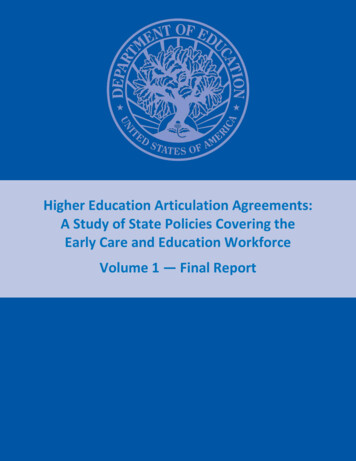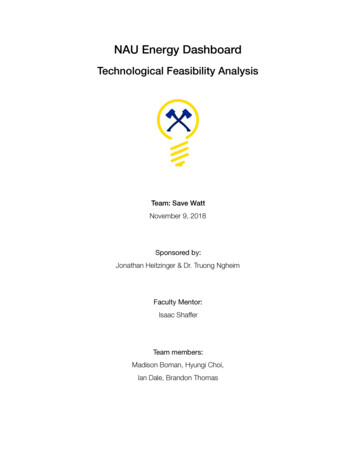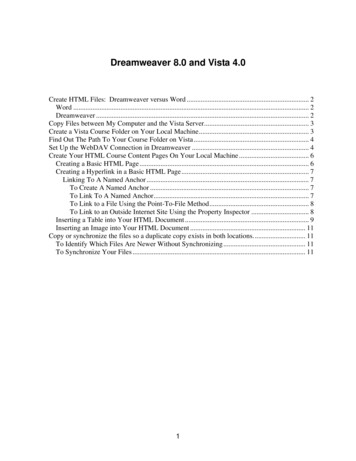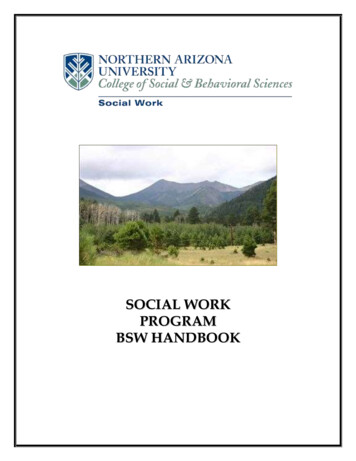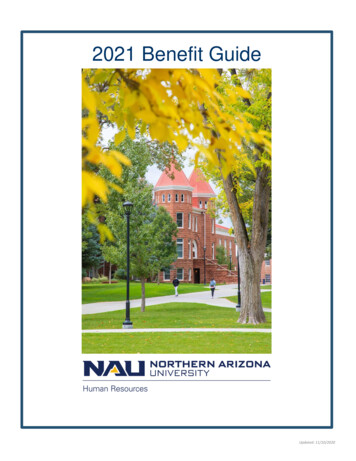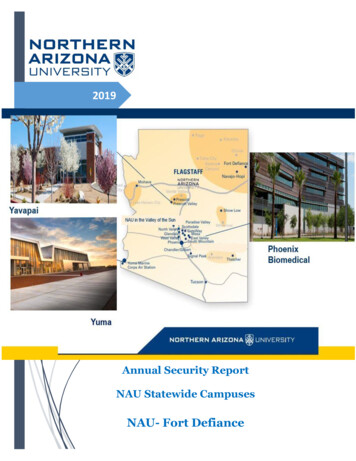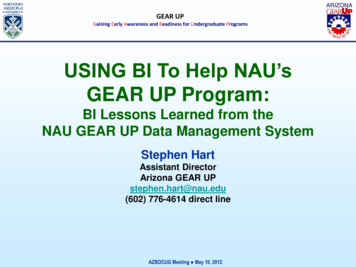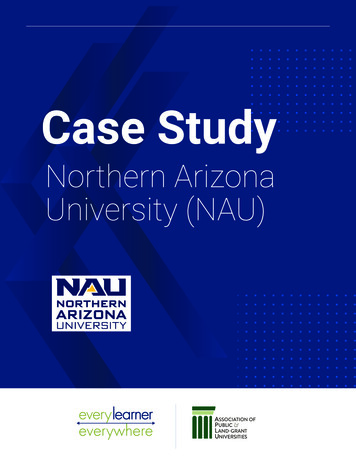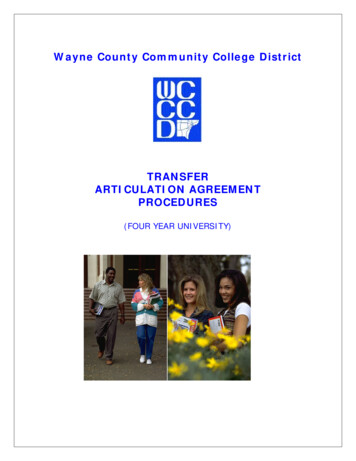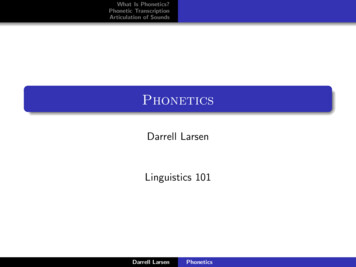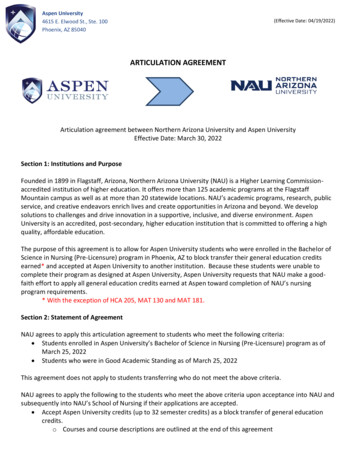
Transcription
Aspen University4615 E. Elwood St., Ste. 100Phoenix, AZ 85040(Effective Date: 04/19/2022)ARTICULATION AGREEMENTArticulation agreement between Northern Arizona University and Aspen UniversityEffective Date: March 30, 2022Section 1: Institutions and PurposeFounded in 1899 in Flagstaff, Arizona, Northern Arizona University (NAU) is a Higher Learning Commissionaccredited institution of higher education. It offers more than 125 academic programs at the FlagstaffMountain campus as well as at more than 20 statewide locations. NAU’s academic programs, research, publicservice, and creative endeavors enrich lives and create opportunities in Arizona and beyond. We developsolutions to challenges and drive innovation in a supportive, inclusive, and diverse environment. AspenUniversity is an accredited, post-secondary, higher education institution that is committed to offering a highquality, affordable education.The purpose of this agreement is to allow for Aspen University students who were enrolled in the Bachelor ofScience in Nursing (Pre-Licensure) program in Phoenix, AZ to block transfer their general education creditsearned* and accepted at Aspen University to another institution. Because these students were unable tocomplete their program as designed at Aspen University, Aspen University requests that NAU make a goodfaith effort to apply all general education credits earned at Aspen toward completion of NAU’s nursingprogram requirements.* With the exception of HCA 205, MAT 130 and MAT 181.Section 2: Statement of AgreementNAU agrees to apply this articulation agreement to students who meet the following criteria: Students enrolled in Aspen University’s Bachelor of Science in Nursing (Pre-Licensure) program as ofMarch 25, 2022 Students who were in Good Academic Standing as of March 25, 2022This agreement does not apply to students transferring who do not meet the above criteria.NAU agrees to apply the following to the students who meet the above criteria upon acceptance into NAU andsubsequently into NAU’s School of Nursing if their applications are accepted. Accept Aspen University credits (up to 32 semester credits) as a block transfer of general educationcredits.o Courses and course descriptions are outlined at the end of this agreement
Aspen University4615 E. Elwood St., Ste. 100Phoenix, AZ 85040(Effective Date: 04/19/2022) Apply these Aspen University credits to NAU’s nursing program as applicable Accept HESI testing scores if taken between January 1 and March 25, 2022, provided by AspenUniversity to be used toward entrance into NAU’s nursing program as applicable.Section 3: Admission and MatriculationThis agreement does not guarantee admission to NAU or admission into any specific program, unlessotherwise stated. Students must apply for admission to NAU in accordance with the rules, policies, andprocedures of NAU in effect at the time of acceptance.As outlined in this agreement, courses transferred will fulfill some NAU program requirements. Students willbe responsible for completing all graduation requirements of NAU in effect at the time of acceptance in orderto earn their degree.Section 4: Changes in Curriculum or Program RequirementsChanges made to relevant curriculum at either Aspen University or NAU will necessitate review of theprograms at both institutions to determine if reassessment of this articulation agreement is necessary. Ifdeemed appropriate, a new agreement will be generated and signed.Each partner assumes responsibility for informing the other of these changes. Changes to curriculum and/orprogram requirements must be communicated in writing no later than 30 days from the date of change.Section 5: Term and TerminationThis agreement shall commence as of March 1, 2022 and shall terminate on March 1, 2024, unless terminatedearlier as provided elsewhere in this agreement. This agreement may be renewed by the mutual writtenagreement of both institutions for additional terms, not to exceed one (1) year. Either party may terminate orsuspend this agreement for convenience upon sixty (60) days’ written notice; provided, however, that theparties shall discuss and reasonably attempt to resolve the issues that led to the notice of termination orsuspension. Notwithstanding the termination of the agreement, any student who has applied for admissionsand meets the terms of this agreement prior to or during the sixty (60) day period shall be treated as if thisagreement continues to be in effect.Section 6: General ProvisionsIn carrying out the responsibilities and obligations of this Agreement, neither party shall be acting as the agentor principal of the other with regard to dealings with third parties, including students. Neither party shall have
Aspen University4615 E. Elwood St., Ste. 100Phoenix, AZ 85040(Effective Date: 04/19/2022)the authority to make any statements, representations, nor commitments of any kind or to take anyaction binding the other except as provided for herein or authorized in writing by the party to be bound.This Agreement constitutes the entire Agreement between the parties. No waiver, consent, modification, orchange of terms of this Agreement shall bind either party unless in writing and signed by both parties.Section 7: SignaturesDr. Jenny Erkfitz, Dean, Bachelor of Science inNursing (Pre-Licensure) programAspen UniversityRoger Bounds, Interim Dean College of Health SciencesNorthern Arizona UniversityDr. Joanne Weiss, ProvostAspen UniversityDr. Karen Pugliesi, ProvostNorthern Arizona UniversityDr. Barb Ake for Dr. Dawn RivasKatie Brown, RegistrarAspen UniversityDawn Rivas, Interim Director, School of NursingNorthern Arizona University
Aspen University4615 E. Elwood St., Ste. 100Phoenix, AZ 85040(Effective Date: 04/19/2022)Aspen University Pre-Professional Nursing CoursesThese general education courses (with the exception of MAT 130, HCA 130 and HCA 205) are to be included inblock transfer of up to 32 semester credits; credits completed at other universities and transferred to AspenUniversity are not covered by this agreement.Course Number and TitleCOM100 Introduction toCommunicationsSemester Credits3MAT130 Fundamentals ofMathematics3BIO210 Microbiology3CMP160 EnglishComposition I3SBS105 Introduction toPsychology3HCA130 Healthcare Writingand Communications3Course DescriptionThis course provides a study of human communication by coveringmajor communication concepts, theories, research, and trends. Thisintroduction communications course will help students tounderstand their own communication behavior as well thecommunication behavior of others. Concepts covered include basictheories of communication, understanding individual communicationstyles, the use of communication across cultures, and listening andcritical thinking skills.Concepts of Fundamental Mathematics will be a review offundamental math concepts for some students and may break newground for others. Students of all backgrounds will be delighted tofind an approach that appeals to all learning styles and reaches outto diverse demographics. Through down-to-earth explanations,patient skill-building, and exceptionally interesting and realisticapplications, this course will empower students to learn and mastermathematics in the real world.This course covers principles of microbiology with emphasis onmicrobial anatomy, microbial disease, and disease prevention. Thecourse includes a broad overview of both the historical and currentfield of microbiology with focus on microbial pathogenicity, thespread of microbial pathogens, the methods of human immunity,and best practices for the diagnosis and treatment of microbialdisease.This course is designed to help students master the traditional fiveparagraph essay and variations of this essay. Four principles arepresented as keys to effective writing: unity, support, coherence,and sentence skills. The first part of the course focuses on the firstthree principles and to some extent on sentence skills. It shows,respectively, how these four principles apply in the different patternsof essay development and in specialized types of writing.This course focuses on the many voices of psychology. To some, thescience of psychology provides its students with a betterunderstanding of others' behaviors. Others view psychology as apathway to self-understanding. Others see the potential for a futurecareer, and some are drawn to psychology by the opportunity forintellectual discovery that its study provides. The overall goal of thiscourse is to provide a comprehensive overview to the subject ofpsychology.This course focuses on the writing needs of students in allied healthfields. Proofreading and revision exercises help develop criticalthinking skills in writing and a keen eye for written work. The coursereviews basic writing concepts but also builds knowledge specific tocommunication in healthcare fields.
Aspen University4615 E. Elwood St., Ste. 100Phoenix, AZ 85040(Effective Date: 04/19/2022)BIO201 Anatomy andPhysiology I3BIO201L Anatomy andPhysiology I-Lab1SBS110 Introduction toSociology3BIO202 Anatomy andPhysiology II3BIO202L Anatomy andPhysiology II-Lab1HCA205 Principles of Health 3and DiseaseSBS120 Diversity andCulture3BIO220 Pathophysiology3The purpose of this course is to provide an overview of the basiccomponents of the human body and how it functions on a cellularlevel to organismal level. The fundamentals of chemistry,biochemistry and cell biology will be presented along with theskeletal, muscular, nervous and integumentary systems. Structure,function, and integration of these systems in health and disease willalso be discussed.The purpose of the laboratory portion of this course is to explorehistology in a hands-on manner under the microscope and to explorethe gross anatomy of the skeletal, muscular, nervous system, andspecial senses. While much of the physiology and microscopicanatomy of this course is covered in the lecture portion, the lab isdesigned to fill in the gaps and focus more on anatomical structuresand recognition of such. This course must be taken concurrentlywith BIO201, which is the complementary didactic course.This introductory course in sociology gives students the opportunityto use sociological imagination to master their social world. Itexamines aspects of the social environment that students mightotherwise ignore, neglect, or take for granted. It looks beneath thesurface of everyday life to help students understand and anticipatehuman behavior in a variety of environments.The purpose of this course is to provide an overview of the systemsof the human body including the endocrine, cardiovascular,respiratory, digestive, immune, urinary and reproductive systems.Fundamentals of fluid and electrolyte balance, cellularcommunication, human nutrition and gene inheritance will also bepresented. The structure, function, and integration of these systemsin both health and disease will be discussed. This course is acontinuation of BIO201.The purpose of the laboratory portion of this course is to explorehistology in a hands-on manner under the microscope and to explorethe gross anatomy of the skeletal, muscular, nervous system, andspecial senses. While much of the physiology and microscopicanatomy of this course is covered in the lecture portion, the lab isdesigned to fill in the gaps and focus more on anatomical structuresand recognition of such. This course is a continuation of BIO201L.This course must be taken concurrently with BIO202, which is thecomplementary didactic course.This course is a comprehensive survey of common diseases affectingeach body system. This class presents the basic principles of humandisease, organized by human organ system. Included in the courseare new diagnostic tests and lab procedures, treatment anddiagnostic sections to include common treatments and generalmedical options, coverage of disease statistics, risk factors fordiseases and disease prevention.This course focuses on understanding and managing diversity.Clearly, diversity is an interdisciplinary field. Much of its theoreticalframework originates in the social sciences. There is somedisagreement among scholars on the definition of diversity; muchless what materials should be included in a course about diversity. Tomeet this challenge, we have selected a text for this course thatgathers a wealth of information from the salient issues surroundingthe topic of diversity.This course is designed to enhance existing understanding of thepathophysiological processes of disease as they affect clients across
Aspen University4615 E. Elwood St., Ste. 100Phoenix, AZ 85040SBS200 HumanDevelopment(Effective Date: 04/19/2022)3the lifespan. The interrelationship of structural and functionalreactions of cells and tissues to genetic alterations and injuriousagents provide the foundation for comprehending clinicalmanifestations and treatment protocols. Critical thinking and nursingmanagement are enhanced through the use of case studies thatintegrate nutritional and pharmacological concepts. Theunderstanding of environmental and biological risk factors providesthe nurse with the knowledge to provide health promotion andprevention education.Using an interdisciplinary approach that emphasizes culture andfamily, Human Development challenges students to understanddevelopment from a broader perspective. Students draw on theirown experiences as they weigh the research and ideas presented inthe course. The course explores controversies about humandevelopment, often within a specific cultural context. Alsoincorporated into each module are questions that link developmentconcepts with addiction related counseling strategies. The materialcovered includes competency-building activities, offering prospectiveaddiction counselors multiple opportunities to develop practical andnecessary skills.
Phoenix, AZ 85040 ARTICULATION AGREEMENT Articulation agreement between Northern Arizona University and Aspen University Effective Date: March 30, 2022 Section 1: Institutions and Purpose Founded in 1899 in Flagstaff, Arizona, Northern Arizona University (NAU) is a Higher Learning Commission-accredited institution of higher education.
